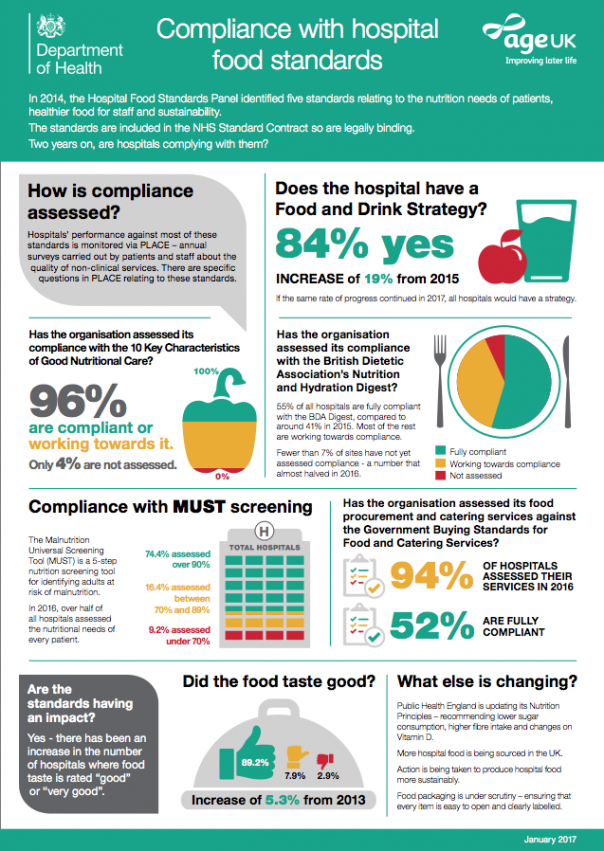
The report, 'Compliance With Hospital Food Standards in the NHS' and subtitled, 'Two Years On: A Review of Progress Since the Hospital Food Standards Panel Report in 2014', says the findings show there has been substantial progress across NHS hospitals.
Signed off by Philip Dunne, the minister of state for health, and Dianne Jeffrey, chair of Age UK, it claims: "A large majority now have a food and drink strategy and compliance with recommended standards has increased: over half of NHS hospitals are now fully compliant with the standards and well over 90% of hospitals have confirmed they are working towards them.
"Patient surveys, including the annual Patient-Led Assessments of the Care Environment (PLACE), have recorded improvements in the quality of food and – importantly – in the overall quality of care around nutrition.
"Though these improvements were small, they are clearly welcome.
"Alongside the work in individual hospitals, there is continued central action on hospital food and drink.
"This includes work led by NHS England on staff health and wellbeing, and on commissioning for better nutrition and hydration for patients.
"Work is also underway within professional bodies, voluntary organisations and industry, as well as across the NHS. This report includes some examples of these initiatives.
"There is still variation in service quality across the country, and there is more to do to make sure that all patients, staff and visitors get the best possible food, but overall performance has improved since the panel reported.
"This is an encouraging start; the challenge now is to maintain the quality, particularly in an environment of efficiency saving."
However, Katherine Button, of Sustain's Campaign for Better Hospital Food, said: “The situation in hospital food standards is diabolical. When the hospital food standards were brought in two years ago, we were promised that these hospital food standards were legally binding.
"With half of hospitals still not meeting even the basic standards, we can now see that this is demonstrably not the case. This means that sick children in hospital wards are not getting the same quality of food that they are legally required to be fed at school when they are well.
"Enough is enough – we need equal legal protections for hospital food, like the protections that exist for food in schools and prisons.”
And Katharine Jenner, from Consensus Action on Salt, Sugar and Health, added: “This is yet more evidence that voluntary measures don’t work, even when they’re dressed up as ‘legally binding’ in NHS Standard contracts for hospitals.
"We need mandatory standards, with rigorous monitoring, reporting and meaningful sanctions for non-compliance.
"While the Department of Health has presented this report as showing progress on compliance, the report should be re-named as a record of non-compliance. The statistics it reveals are shocking.”
Among the findings of the report, it shows:
· 48% of hospitals do not meet Government Buying Standards that give hospitals basic standards to meet on food quality, nutrition, environmental sustainability and animal welfare, standards which the Government says should be mandatory
· Half of hospitals do not meet dietitian guidelines outline by the British Dietetic Association, standards which the Government says should be mandatory
· 30% of patients are at real risk of malnutrition in hospitals, yet only half of hospitals screened every patients for signs that they were struggling to get enough to eat.
· ¼ of English hospitals do not have a food and drink strategy – a requirement of the hospital food standards which the Government says should be mandatory
The hospital food standards were brought into the NHS standard contract in 2014 , which the Department of Health said made them legally binding.